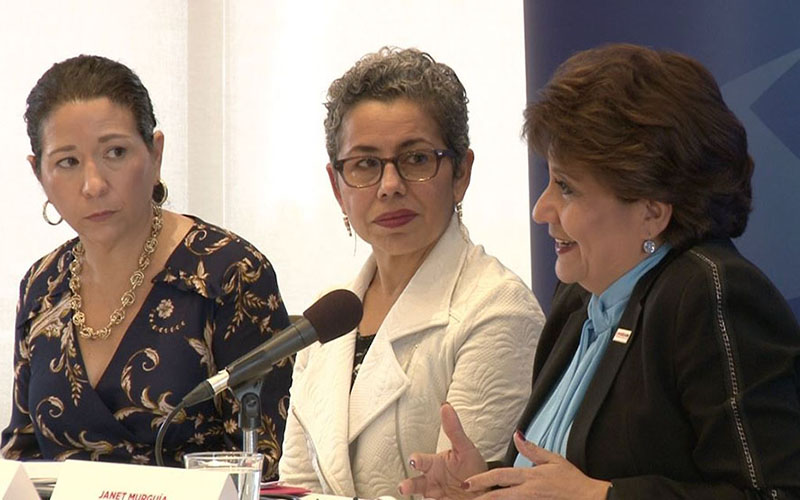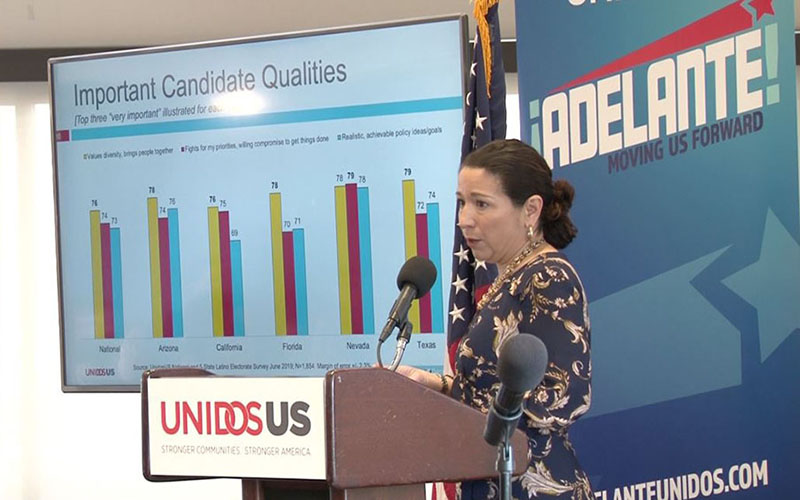
From left, Sylvia Manzano of Latino Decisions and Clarissa Martinez and Janet Murguia, both of UnidosUS, unveil the multimillion-dollar civic engagement program they hope will boost Latino voter turnout in 2020. (Photo by Heather Cumberledge/Cronkite News)

Sylvia Manzano, a principal at Latino Decisions, said one reason for the gap between eligible and actual Latino voters is that those voters who live in noncompetitive states may not “particularly feel engaged.” (Photo by Heather Cumberledge/Cronkite News)
WASHINGTON – Hispanics are expected to be the largest bloc of minority voters by the 2020 elections, but advocates say those numbers will be of little use if potential voters aren’t motivated to turn out at the polls.
That’s why they announced plans Thursday for a multimillion-dollar campaign focused on five states, including Arizona, that will be aimed at boosting Latino civic engagement across the board.
The campaign by UnidosUS will work with hundreds of local advocacy groups, including 11 in Arizona, with a goal of registering 120,000 new voters nationwide in time for the elections, while reaching out to more than 350,000 current voters with get-out-the-vote activities.
“It’s meant to be more than a voter registration campaign,” UnidosUS President and CEO Janet Murguia said Thursday. “It means deploying the full force of our organization to lift our community up and make our voices heard at the ballot box in the 2020 elections.”
Murguia said the program aims to close what she calls a considerable gap between the number of eligible Latino voters and the number of actual voters.
While the Pew Research Center predicts that the number of voting-eligible Hispanics could hit 32 million by 2020, UnidosUS estimates that just about 14 million will actually turn out to vote. That would be more than the 13 million who voted in 2016 – but the gap between eligible and actual voters would be wider, as just 27.3 million Latinos were eligible to vote that year.
One of the reasons the gap exists is because Hispanics in noncompetitive states do not “particularly feel engaged” to vote, said Sylvia Manzano, a principal at Latino Decisions.
“There’s also a really important point about candidate and campaign outreach and contact, and of course we have some other demographics working against us,” Manzano said at the National Press Club event where the program was announced.
Arizona is one of the states targeted for the program – along with California, Texas, Florida and Nevada – even though organizers acknowledge that the state has a head start in organizing on most others because of its recent history of controversial laws aimed at the state’s immigrants.
Clarissa Martinez, deputy vice president for policy and advocacy at UnidosUS, said Arizona’s strong organizing structure began to take shape in response to SB 1070, the state law that lets police demand the citizenship status of suspects.
She said Latino voters were further motivated by then-Sheriff Joe Arpaio of Maricopa County, who aggressively enforced SB 1070 and was convicted for criminal contempt of court for refusing to stop his deputies from racially profiling suspects.
“That advocacy led to putting a stop to the second slew of anti-immigrant bills that (former state Sen. Russell) Pearce was going to do, then to his ousting then eventually to Joe Arpaio’s ousting,” Martinez said. “The community has organized itself and will continue to do that.”
Activists in Arizona said those efforts only continued in the face of then-candidate Donald Trump’s anti-immigrant rhetoric and his actions since becoming president, such as the attempt to end DACA – the Deferred Action for Childhood Arrivals program – and his militarization of the U.S-Mexico border.
“You see a lot of torment and uncertainty in the community,” said Petra Falcon, the executive director of Promise Arizona. “All of that stuff that is so unhumanitarian and hateful is having a toll on people and is having an impact on them.”
Promise Arizona said it has not stopped working to engage the Hispanic community since last year’s elections, noting that with eight elections over the past 15 months in Phoenix alone “we’ve been in campaign mode for the last year and a half.”
“The work has already started,” Falcon said of efforts for 2020. “We feel really good at where we’re at in terms of our focus and energy and quite frankly, we have to move forward.”